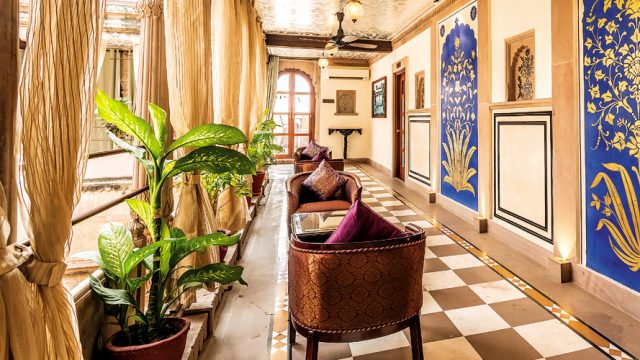That is Gaay Ghat,” my guide points out. “Varanasi’s ghats have interesting backstories, but foreign tourists always found the name funny. So, to emphasise the origin, that is, the cow, an additional a was added.” As we float down the Ganga on the motorised bajra, she indicates other ghats—where scenes from the acclaimed film Masaan were shot, where a lesser-known but equally important wooden Nepali temple stands, the burning ghat where the fire never goes out, the Jantar Mantar close to it painted in a vibrant pink, and finally Dashashwamedh Ghat where the famous Ganga arti takes place every evening. “You’ll go there this evening,” I am promised after being regaled with stories from Varanasi’s past during the ride.
Soon the bajra begins to turn towards a ghat called Darbhanga. But the dominant brownish sandstone structure standing on the riverbank is more interesting. As we come closer, I see finer details and also, at the bottom, what seems like an elevator. “That’s the oldest elevator in the country,” I’m told. It was installed a 100 years ago to make the erstwhile maharaja’s commute easier.
Inside the old-fashioned elevator, I’m immediately transported to a bygone era. I feel a smile coming on—I feel in my bones that it is going to be an interesting weekend. I enter a small foyer tastefully decorated with sofas, and hand-drawn golden frescoes along the ceiling. The walls have ornate carvings that add to the heritage look. The use of sandstone gives the place a cooling effect but also a royal and opulent touch. It’s no wonder that Brijrama Palace is wowing guests since it opened two years ago.
The palace is one of the ancient city’s oldest landmarks. It was initially built as a fort in the early 1800s by Shridhar Narayana Munshi, minister for the estate of Nagpur, and the evidence remains in its doorways, which are small, to make entry difficult. The fort and ghat was acquired by Rameshwar Singh Bahadur, the king of Darbhanga, in 1915, when it was turned into a palace. But after it fell into disarray for many years, Brijrama acquired the property in 1994. It took almost 20 years to carry out the restoration work (one can see the evidence in old black-and-white images) to make a property fit for guests.

The palace’s location makes it difficult to reach by car as Varanasi is famous for its narrow lanes. It’s easier to fly into the city, the point at which the Brijrama hospitality starts, and then take an hour-long road journey to reach Bhisasur Ghat near Malviya Bridge. A bajra comes to pick you up at the ghat and showcases the best views en route to Brijrama Palace. The whole journey is an experience, and is a great start to a luxurious weekend.

My room is beautifully done up in shades of red and pink Banarasi, with a comfortable bed, ornate chairs, traditional lamps and colourful paintings, the usual tea- and coffee-making facilities, and to my joy, a copy of the magazine I’m employed at. There is attention to detail that impresses. A quick shower later, I come out to explore. The hotel is built around a courtyard or Bada Aangan where two statues, discovered during the restoration period, are displayed. From any of the three storeys, one can look down to the courtyard. The corridors that surround the open space are elegantly designed in shades of silver, black and cream. It gives off a royal feel, which you come to experience and expect here.
I make my way up to the Kamalya Terrace for complimentary snacks in the evening. One can soak in the beautiful view of the Ganga while munching on finger foods on customised china. The property offers 34 rooms, but if one really wants a fabulous view to wake up to, book one of the four suites with a panoramic view of the river.
The Information
Location: Darbhanga Ghat, Varanasi. Approx. 26km (90mins) from the airport
Accommodation: 34 rooms, including suites
Tariff: From ₹15,000 approx.
Contact: +91-9129414141, Brijrama Palace




